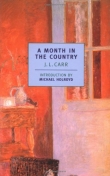BKMT READING GUIDES
A Month in the Country (New York Review Books Classics)
by J.L. Carr, Michael Holroyd
Paperback : 135 pages
3 clubs reading this now
1 member has read this book
Introduction
In J. L. Carr's deeply charged poetic novel, Tom Birkin, a veteran of the Great War and a broken marriage, arrives in the remote Yorkshire village of Oxgodby where he is to restore a recently discovered medieval mural in the local church. Living in the bell tower, surrounded by the resplendent countryside of high summer, and laboring each day to uncover an anonymous painter's depiction of the apocalypse, Birkin finds that he himself has been restored to a new, and hopeful, attachment to life. But summer ends, and with the work done, Birkin must leave. Now, long after, as he reflects on the passage of time and the power of art, he finds in his memories some consolation for all that has been lost.
Editorial Review
Any good reader has, well, had it with novels of healing. The culture of confession has given rise to novels that begin with an unspeakable act (graphically described) and end in redemption (this part is usually more vague). That's not how it works in J.L. Carr's quiet, brief, dreamy A Month in the Country. Writing in 1978, Carr's narrator, Tom Birkin, recalls the summer of 1920. A veteran of the Great War and a cuckold, Tom arrives in Oxgodby to restore a medieval mural in the church. His single season in this town in the north of England passes quickly: he sleeps in the belfry, makes a friend or two, falls secretly in love with the vicar's wife, and, chipping away at plaster and dirt, uncovers a lost masterpiece. These events seem to melt past Tom in the heat of the perfect, fleeting English summer: "The front gardens of cottages were crammed with marjoram and roses, marguerites, sweet William, at night heavy with the scent of stocks. The Vale was heavy with leaves, motionless in the early morning, black caves of shadow in the midday heat, blurring the sound of trains hammering north and south."Carr devotes many fewer words to Tom's time in the war. The vicar's wife tries to ask him about it. "'What about hell on earth?' she said. I told her I'd seen it and lived there and that, mercifully, they usually left an exit open." His healing consists of not talking about his past--perhaps a revolutionary notion these days. A Month in the Country, with its paean to a lost, good place, oddly recalls Alain-Fournier's Le Grand Meaulnes. But where that novel was elliptical, Carr's work values clarity and simplicity above all. These are rare enough qualities, but to find them in a novel of romance and healing is a rarer pleasure still. --Claire Dederer
Discussion Questions
No discussion questions at this time.Book Club Recommendations
Recommended to book clubs by 0 of 0 members.
Book Club HQ to over 90,000+ book clubs and ready to welcome yours.
Get free weekly updates on top club picks, book giveaways, author events and more








